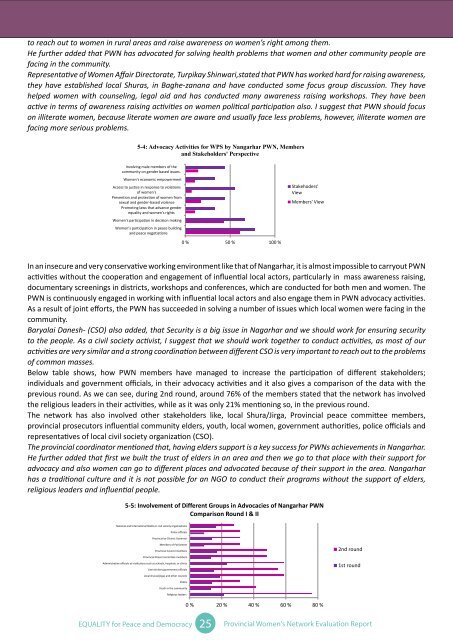Evaluation Report
4HMKrjjbt
4HMKrjjbt
Create successful ePaper yourself
Turn your PDF publications into a flip-book with our unique Google optimized e-Paper software.
to reach out to women in rural areas and raise awareness on women’s right among them.<br />
He further added that PWN has advocated for solving health problems that women and other community people are<br />
facing in the community.<br />
Representative of Women Affair Directorate, Turpikay Shinwari,stated that PWN has worked hard for raising awareness,<br />
they have established local Shuras, in Baghe-zanana and have conducted some focus group discussion. They have<br />
helped women with counseling, legal aid and has conducted many awareness raising workshops. They have been<br />
active in terms of awareness raising activities on women political participation also. I suggest that PWN should focus<br />
on illiterate women, because literate women are aware and usually face less problems, however, illiterate women are<br />
facing more serious problems.<br />
5-4: Advocacy Activities for WPS by Nangarhar PWN, Members<br />
and Stakeholders' Perspective<br />
Involving male members of the<br />
community on gender based issues.<br />
Women’s economic empowerment<br />
Access to justice in response to violations<br />
of women’s<br />
Prevention and protection of women from<br />
sexual and gender-based violence<br />
Promoting laws that advance gender<br />
equality and women’s rights<br />
Women’s participation in decision making<br />
Women’s participation in peace building<br />
and peace negotiations<br />
0 % 50 % 100 %<br />
Stakehoders'<br />
View<br />
Members' View<br />
In an insecure and very conservative working environment like that of Nangarhar, it is almost impossible to carryout PWN<br />
activities without the cooperation and engagement of influential local actors, particularly in mass awareness raising,<br />
documentary screenings in districts, workshops and conferences, which are conducted for both men and women. The<br />
PWN is continuously engaged in working with influential local actors and also engage them in PWN advocacy activities.<br />
As a result of joint efforts, the PWN has succeeded in solving a number of issues which local women were facing in the<br />
community.<br />
Baryalai Danesh- (CSO) also added, that Security is a big issue in Nagarhar and we should work for ensuring security<br />
to the people. As a civil society activist, I suggest that we should work together to conduct activities, as most of our<br />
activities are very similar and a strong coordination between different CSO is very important to reach out to the problems<br />
of common masses.<br />
Below table shows, how PWN members have managed to increase the participation of different stakeholders;<br />
individuals and government officials, in their advocacy activities and it also gives a comparison of the data with the<br />
previous round. As we can see, during 2nd round, around 76% of the members stated that the network has involved<br />
the religious leaders in their activities, while as it was only 21% mentioning so, in the previous round.<br />
The network has also involved other stakeholders like, local Shura/Jirga, Provincial peace committee members,<br />
provincial prosecutors influential community elders, youth, local women, government authorities, police officials and<br />
representatives of local civil society organization (CSO).<br />
The provincial coordinator mentioned that, having elders support is a key success for PWNs achievements in Nangarhar.<br />
He further added that first we built the trust of elders in an area and then we go to that place with their support for<br />
advocacy and also women can go to different places and advocated because of their support in the area. Nangarhar<br />
has a traditional culture and it is not possible for an NGO to conduct their programs without the support of elders,<br />
religious leaders and influential people.<br />
5-5: Involvement of Different Groups in Advocacies of Nangarhar PWN<br />
Comparison Round I & II<br />
National and International NGOs or civil society organizations<br />
Police officials<br />
Provincial or District Governor<br />
Members of Parliament<br />
Provincial Council members<br />
Provincial Peace Committee members<br />
Administrative officials at institutions such as schools, hospitals, or clinics<br />
Line ministry government officials<br />
2nd round<br />
1st round<br />
Local shuras/jirgas and other councils<br />
Elders<br />
Youth in the community<br />
Religious leaders<br />
0 % 20 % 40 % 60 % 80 %<br />
EQUALITY for Peace and Democracy<br />
25<br />
Provincial Women's Network <strong>Evaluation</strong> <strong>Report</strong>


